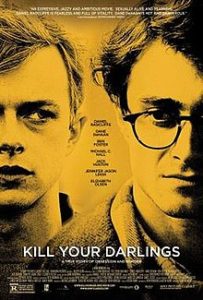
Kill Your Darlings
Release date: Oct. 16, 2013
Directed by John Krokidas
Starring Daniel Radcliffe, Dane DeHann, Elizabeth Olsen, Jack Huston, Michael C. Hall, Jennifer Jason Leigh, and Ben Foster
Available on several streaming services, including Netflix and Amazon Prime
The title caught my attention. It’s a common catchphrase used by editors. (See “Interesting,” below.) I’ve used it many times myself. The description told me that it was about three of my favorite literary personalities: Allen Ginsberg, William Burroughs, and Jack Kerouac.
The Story
In 1944, young Allen Ginsberg (Daniel Radcliffe) has a rival for the affections of his charismatic classmate Lucien Carr (Dane DeHaan). When the rival is found dead, Carr, Burroughs, and Kerouac are arrested for murder.
What I Liked About It
* As I said, it was about Allen Ginsberg, William Burroughs, and Jack Kerouac.
* The story itself is fascinating. It made me do some research to learn more.
* Compelling performances by all four principal actors.
But… there are purportedly a number of inaccuracies in the depiction of the actual events. I read a bit about them. They didn’t bother me.
This is not a big movie. It’s not a film that will change your life. Its ambition is modest. Its scope is limited. It’s a small package that works.
Critical Reception
* “Krokidas’s romantic sense of the characters and the moment corresponds precisely to the way those young men saw themselves – at once closeted and defiant, making up the rules of art and sexuality as they went along.” (Amy Tobin, Film Comment Magazine)
* “Sexy and self-aware, with a 1940s-style Brat Pack feel.” (David Aldridge, Radio Times)
* “Foster is wonderful as the watchful, weak Burroughs, at ease only when drugged, with a mouth like a cat’s bum. But DeHaan is even better.” (Charlotte O’Sullivan, London Evening Standard)
You can watch the trailer here.
Interesting
“Kill your darlings” is a popular piece of writing advice that is often attributed to William Faulkner, but can actually be traced back to the English writer Sir Arthur Quiller-Couch (1863-1944). It means that you have to get rid of all the unnecessary elements (words, side plots, characters, etc.) – no matter how hard you worked to “create” them – that get in the way of your story.
